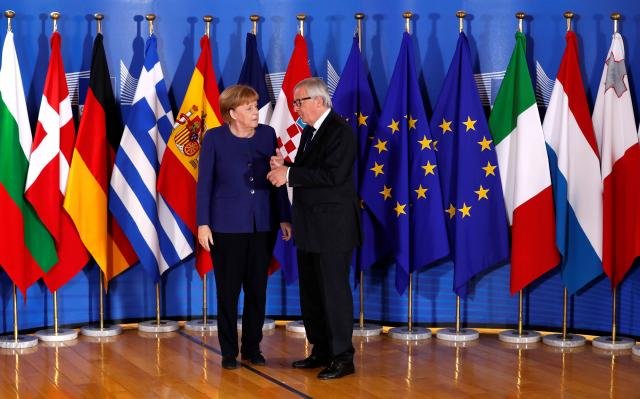German Chancellor Angela Merkel asked EU leaders on Sunday to stop asylum seekers moving freely around the bloc during emergency talks on migration, an issue that is threatening her ruling coalition.
“One large part of today’s discussions will be protecting the outside borders and how we reduce illegal migration to Europe,” Merkel said on arriving for the talks bringing together 16 of 28 EU national leaders.
“There will also be a discussion about secondary migration, how do we treat each other fairly inside (the free-travel zone of) Schengen, how can we find a reasonable balance,” she added.
Although arrivals across the Mediterranean are only a fraction of what they were in 2015, when more than a million people reached Europe, a recent opinion poll showed migration was the top concern for the EU’s 500 million citizens.
Italy has long struggled to cope with arrivals and its new populist government has said it would reject any ideas that would see it handle even more people.
“We want to tackle the problem in a structural way. Our public opinion is asking for this,” Italian Prime Minister Giuseppe Conte said when arriving for the talks, adding he would propose his new ideas on migration.
Unable to agree, they have become more restrictive on asylum and tightened their external borders to let fewer people in. Only 41,000 refugees and migrants have made it to the EU across the sea so far this year, U.N. figures show.
But the issue has in the meantime won and lost elections for politicians across the bloc from Italy to Hungary, with voters favoring those advocating a tougher stance on migration.
German Chancellor Angela Merkel is welcomed by European Commission President Jean-Claude Juncker at the start of an emergency European Union leaders summit on immigration at the EU Commission headquarters in Brussels, Belgium June 24, 2018. REUTERS/Yves Herman/Pool
DOMESTIC PRESSURES
Merkel is under pressure because her longtime conservative allies, Bavaria’s Christian Social Union (CSU), have threatened to start turning away at the German border all asylum seekers already registered elsewhere in the EU unless the bloc reaches an agreement on distributing them more evenly.
They mostly live in countries like Greece and Italy – both long overwhelmed with arrivals – or wealthy states like Germany or Sweden, where they choose to try to start a new life.
The bloc has been unable to break the deadlock, the bad blood spilling over to other areas of their cooperation, including crucial talks on the bloc’s next seven-year budget from 2021.
Merkel opposes the idea by the CSU, which will face the anti-immigration AfD party in Bavarian elections in October, because it would mean rigid border controls inside the Schengen zone. That would have a knock-on effect on all other EU states as well as cross-border business and travel.
TunisianMonitorOnline (Reuters)




